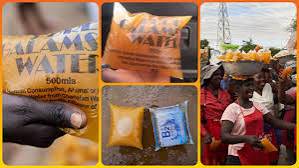The Rise of Packaged Galamsey Sachet Water: A New Brand on the Market
In recent years, the issue of galamsey, or illegal small-scale mining, has captured significant attention in Ghana. This practice, while economically beneficial to some, has led to severe environmental degradation, water pollution, and health risks. In a surprising twist, a new brand of packaged galamsey sachet water has emerged in the market, stirring both intrigue and controversy.
What is Galamsey Sachet Water?
Galamsey sachet water is a term that has recently gained traction, referring to bottled or sachet water that is sourced from areas affected by illegal mining activities. While traditional sachet water is known for its affordability and convenience, the new brand aims to capitalize on the growing demand for drinking water in Ghana. However, it also raises serious questions regarding safety, sustainability, and ethical practices.
The New Brand: "Clear Mine Water"
The newest player in this market is "Clear Mine Water," which markets itself as a premium product derived from the heart of mining regions. The brand claims to undergo a rigorous filtration process to ensure purity, aiming to provide consumers with an affordable option while promising quality. The packaging is eye-catching, featuring vibrant colors and a tagline that suggests freshness and health.
The Controversy
While "Clear Mine Water" has quickly gained popularity among consumers, it has also sparked significant debate. Critics argue that sourcing water from areas impacted by galamsey undermines efforts to combat illegal mining and its negative repercussions. The brand's promotion of water from these regions raises ethical concerns about whether it inadvertently supports an industry that has led to devastating environmental consequences.
Moreover, there are concerns regarding the safety of the water itself. Although the brand asserts that it adheres to health regulations, the reality is that water from mining-affected areas may contain harmful contaminants. Critics warn that even the most advanced filtration techniques cannot completely eliminate the risks associated with heavy metals and other pollutants often found in such water sources.
Health Implications
The health implications of consuming water sourced from mining areas cannot be overstated. Heavy metal contamination, including arsenic, lead, and mercury, can lead to severe health issues over time, including kidney damage and neurological disorders. Public health officials have expressed concern that the rise of such brands could lead to increased health risks for vulnerable populations, particularly those who rely on affordable water sources without access to safe alternatives.
Regulatory Responses
In light of these concerns, regulatory bodies in Ghana are grappling with how to respond to the emergence of "Clear Mine Water." There is an urgent need for a comprehensive framework that addresses the sourcing, production, and distribution of sachet water to ensure public safety. Stakeholders are calling for stricter regulations and oversight to ensure that brands do not exploit loopholes to capitalize on cheap water sources.
Consumer Awareness
Consumer awareness plays a crucial role in the future of packaged galamsey sachet water. As public discourse continues to unfold, educating consumers about the risks associated with such products is vital. Transparency from brands regarding their sourcing practices, quality assurance measures, and potential health risks can empower consumers to make informed choices.
Conclusion
The introduction of "Clear Mine Water" into the packaged water market highlights a complex intersection of economic necessity, environmental responsibility, and public health. While it addresses a real demand for affordable drinking water, it also raises serious ethical and safety concerns. As consumers navigate this new landscape, it is essential for regulatory bodies, health officials, and the community to work together to ensure that access to safe drinking water does not come at the expense of environmental integrity and public health. The future of sachet water in Ghana depends on finding a balance between these competing interests.



No comments yet
Be the first to share your thoughts!